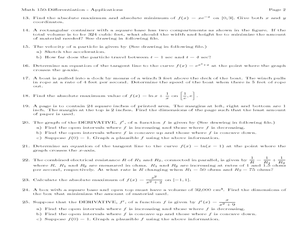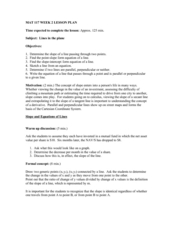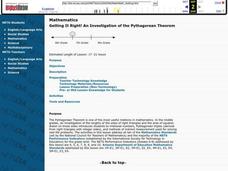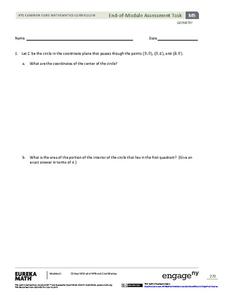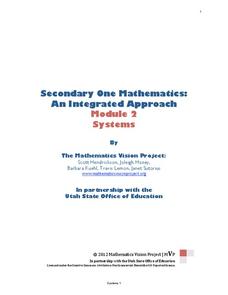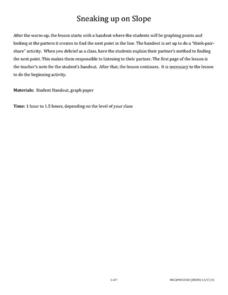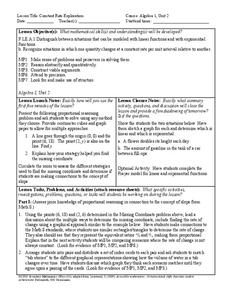Curated OER
Math 150 - Differentiation Applications
In this differentiation learning exercise, students solve 25 short answer word problems. Students solve application word problems by finding the derivatives of functions.
Curated OER
Lines in the Plane
Students differentiate between parallel and perpendicular lines. In this algebra lesson, students graph linear equations using the slope intercept form. They classify lines based on their slopes.
Curated OER
Getting It Right! An Investigation of the Pythagorean Theorem
Learners construct a variety of right triangles using a right-angled set square, cutting corners from pieces of paper or cardboard, and using dynamic geometry software. They measure the sides of these various right triangles and record...
Del Mar College
Solving Systems of Equations
Lets keep the system working and show learners the three ways to solve linear systems of equations. Each method includes step-by-step instructions to work their way through the problem. The same problem is used for each method to show...
Broward County Schools
Women's Contributions to the United States
Betsy Ross, Toni Morrison, Sacajawea, Amelia Earhart, Maya Lin, Sally Ride, Judy Baca. No matter the subject area or the grade level you teach you will find much to value in a manual that focuses on the contributions U.S. women have...
Curated OER
Circles
In this circles worksheet, 10th graders solve and complete 10 different problems that include various parts of a circle. First, they write the name of the designated coordinates in each. Then, students determine the diameter, chord,...
Curated OER
Complex numbers in polar form
Students plot complex numbers in the polar plane. They convert complex numbers in polar form to rectangular form. Students plot coordinates in the polar plane. They plot complex numbers in the complex plane. Students are asked to...
EngageNY
How Do Dilations Map Lines, Rays, and Circles?
Applying a learned technique to a new type of problem is an important skill in mathematics. The lesson asks scholars to apply their understanding to analyze dilations of different figures. They make conjectures and conclusions to...
EngageNY
The Geometric Effect of Some Complex Arithmetic 1
Translating complex numbers is as simple as adding 1, 2, 3. In the ninth lesson in a 32-part series, the class takes a deeper look at the geometric effect of adding and subtracting complex numbers. The resource leads pupils into what it...
EngageNY
Geometry Module 5: End-of-Module Assessment
The lessons are complete. Learners take an end-of-module assessment in the last installment of a 23-part module. Questions contain multiple parts, each assessing different aspects of the module.
Illustrative Mathematics
Walk-a-thon 1
Your mathematician's job is to explore the relationship between hours and miles walked during a walk-a-thon. The activity compels your learners to experiment with different means in finding out this proportional relationship. The answer...
EngageNY
Motion Along a Line – Search Robots Again
We can mathematically model the path of a robot. Learners use parametric equations to find the location of a robot at a given time. They compare the paths of multiple robots looking for parallel and perpendicular relationships and...
EngageNY
An Area Formula for Triangles
Use a triangle area formula that works when the height is unknown. The eighth installment in a 16-part series on trigonometry revisits the trigonometric triangle area formula that previously was shown to work with the acute triangles....
Mathematics Vision Project
Module 2: Systems of Equations and Inequalities
The brother-sister pair Carlos and Clarita need your class's help in developing their new pet sitting business. Through a variety of scenarios and concerns presented to the siblings, the learners thoroughly explore systems of equations...
Shmoop
Functions Worksheet 5
To the point and deeper thinking are both types of questions included in the worksheet. Begin the practice of solving quadratics and then finish with five questions asking quadratic and exponential application problems.
PBS
Adding Integers
Your sixth and seventh graders deepen their understanding of a number line and adding integers in this concrete, hands-on activity. Learners play "Warehouse Puzzle" and then discuss their game strategies and the characteristics...
Curated OER
Lesson 2 Solving y=mx+b systems
Students solve linear systems using slope intercept form. In this algebra lesson, students solve equations by rewriting them in the form y = mx + b. They evaluate coordinate pairs to see if they are a solution to the problem. Students...
Radford University
Parallel Lines, Transversals, and Angles: What’s the Connection?
Streets, bridges, and intersections, oh my! Parallel lines and transversals are a present in the world around us. Learners begin by discovering the relationship of the angles formed by parallel lines and a transversal. They then...
Alabama Learning Exchange
Triangle Congruence with Rigid Motion
Combine transformations and triangle congruence in a single lesson. Scholars learn to view congruent triangles as a rigid transformation. Using triangle congruence criteria, learners identify congruent triangles and the rigid...
West Contra Costa Unified School District
Sneaking Up on Slope
Pupils determine the pattern in collinear points in order to determine the next point in a sequence. Using the definition of slope, they practice using the slope formula, and finish the activity with three different ways to...
Howard County Schools
Constant Rate Exploration
Question: What do rectangles and bathtub volume have in common? Answer: Linear equations. Learn how to identify situations that have constant rates by examining two different situations, one proportional and one not proportional.
Mathematics TEKS Toolkit
Am I Related to Myself?
Elementary or middle schoolers use ratios to discover some nearly constant relationships between measurements of parts of the human body. They find and record pairs of measurements and determine the relationship between the pairs. Pupils...
Illustrative Mathematics
Walk-a-thon 2
During a walk-a-thon your learners must determine the walking rate of Julianna's progress. Using tables, graphs, and an equation, they must be able to calculate the time it took her to walk one mile and predict her distance based on the...
Mathematics Assessment Project
Representing Inequalities Graphically
A new, improved version of the game Battleship? Learners graph linear inequalities on the coordinate plane, then participate in a game where they have to guess coordinate points based on the solution to a system of linear...
